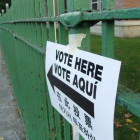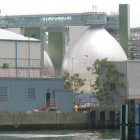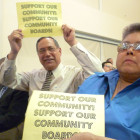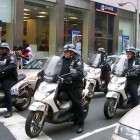Mayor Bloomberg, at left, speaks in front of a giant Mayor Bloomberg, at right, during the 2009 campaign. Some public testimony to the Charter Revision Commission held that the mayor’s influence looms too large of the Conflict of Interest Board and other entities. Photo by: Jarrett Murphy
The charter commission hears from experts as it considers whether the city’s ethics monitors are sufficiently independent. By: Jarrett Murphy
During its first round of public hearings, the city’s Charter Revision Commission heard more than one speaker suggest that it was inappropriate for the city’s Conflicts of Interest Board—which largely regulates the mayor and his appointees—to be composed entirely of mayoral appointees. On Wednesday evening, the commission will take up that concern, and hear from experts.









